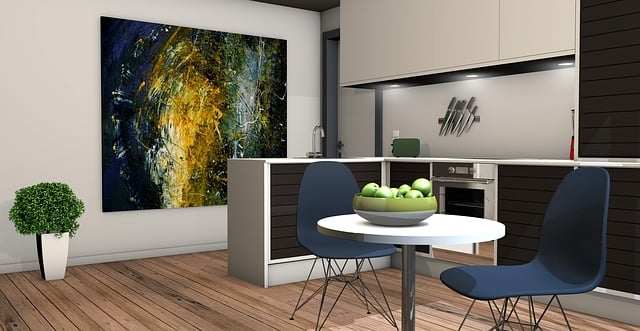Remodeling your kitchen sustainably starts with eco-friendly materials. Choose certified, recycled, or reclaimed wood for cabinetry, and opt for unique recycled or bamboo countertops. Incorporate low-VOC finishes for healthier air, and source local products to reduce transportation emissions. Prioritize energy efficiency with LED lighting and smart appliances for a beautiful, responsible kitchen renovation that enhances indoor air quality and reduces your carbon footprint.
“Revolutionize your kitchen with a modern, sustainable makeover! In today’s digital era, eco-conscious remodeling is not just a trend but a responsible choice. Discover how to create an energy-efficient kitchen while reducing your environmental footprint. From selecting recycled materials and choosing green countertops to integrating smart technology, this guide explores sustainable kitchen design ideas. Embrace a greener future with our comprehensive tips on eco-friendly kitchen renovations, ensuring both style and sustainability.”
- Choosing Eco-Friendly Materials for Your Kitchen Remodel
- – Discussion on sustainable cabinetry and recycled kitchen materials
- – Benefits of using recycled content and local products
- Designing Energy-Efficient Kitchens
Choosing Eco-Friendly Materials for Your Kitchen Remodel
When remodeling your kitchen with sustainability in mind, selecting eco-friendly materials is a fantastic place to start. Opting for sustainable options doesn’t mean sacrificing style or functionality; instead, it offers an array of stylish and innovative choices that are kind to the planet. Consider sustainable cabinetry made from recycled or certified woods, which can add warmth and character to your space while reducing environmental impact.
Recycled kitchen materials, such as countertops made from reclaimed wood, stone, or even glass, not only divert waste from landfills but also provide unique visual appeals. Eco-friendly countertops are available in various materials, including bamboo, recycled content stones, and solidified food scraps—all of which offer durability and low-VOC properties for a healthier home environment. These choices contribute to a green kitchen renovation that is both beautiful and responsible.
– Discussion on sustainable cabinetry and recycled kitchen materials
Modern kitchen remodels offer a fantastic opportunity to merge style with sustainability, creating beautiful spaces that are kind to both your home and the planet. When it comes to materials, sustainable cabinetry is a key player in any eco-friendly kitchen design. These cabinets can be crafted from reclaimed wood, bamboo, or even recycled aluminum and stainless steel, reducing the environmental impact of your remodel. Look for options with certified sustainable certifications like FSC (Forest Stewardship Council) for wood products, ensuring responsible forest management.
Beyond cabinetry, incorporating recycled kitchen materials is another effective strategy. From counter-tops made from recycled glass, granite, or even plastic bottles to backsplashes utilizing reclaimed tiles or natural stone scraps, these choices not only reduce waste but can also add unique visual elements to your space. Additionally, consider low-VOC (Volatile Organic Compound) finishes and adhesives during your low-impact kitchen renovation to minimize indoor air pollution, making your eco-friendly kitchen a healthier one too.
– Benefits of using recycled content and local products
In the pursuit of an eco-friendly kitchen remodeling project, the use of recycled content and local products offers a multitude of benefits. Sustainable kitchen design not only reduces environmental impact but also contributes to a greener, healthier living space. By incorporating recycled kitchen materials, from repurposed wood to upcycled appliances, homeowners can minimize waste and give new life to existing resources. This approach aligns perfectly with the concept of a low-VOC (Volatile Organic Compound) kitchen remodel, ensuring better air quality within your home.
Additionally, opting for eco-friendly countertops made from materials like recycled glass or bamboo not only adds aesthetic appeal but also supports responsible resource management. Local products further enhance sustainability by reducing transportation emissions and fostering support for nearby businesses. These choices collectively contribute to a more balanced ecosystem and help preserve our planet for future generations, making them integral components of any green kitchen renovation project.
Designing Energy-Efficient Kitchens
When designing modern kitchens with sustainability in mind, energy efficiency is a key focus area. Eco-friendly kitchen remodeling involves incorporating features that reduce energy consumption and minimize environmental impact. Simple yet effective strategies like LED lighting, smart appliances, and proper insulation can significantly lower energy bills and carbon footprint.
Sustainable kitchen design extends to the choice of materials as well. Opting for recycled kitchen materials, such as reclaimed wood or repurposed fixtures, reduces waste and supports sustainable practices. Eco-friendly countertops made from materials like bamboo or recycled glass not only look appealing but also contribute to a greener home. Additionally, selecting sustainable cabinetry constructed with non-toxic, low-VOC finishes ensures a healthier living space while promoting environmentally conscious choices in kitchen remodels.
Modern kitchen remodels don’t have to compromise style or functionality for sustainability. By choosing eco-friendly materials like recycled content and local products, opting for energy-efficient appliances, and incorporating sustainable cabinetry and countertops, you can create a beautiful, practical space that also benefits the environment. A green kitchen renovation not only reduces your carbon footprint but also adds value to your home, making it a smart and stylish choice for today’s conscious consumers.
